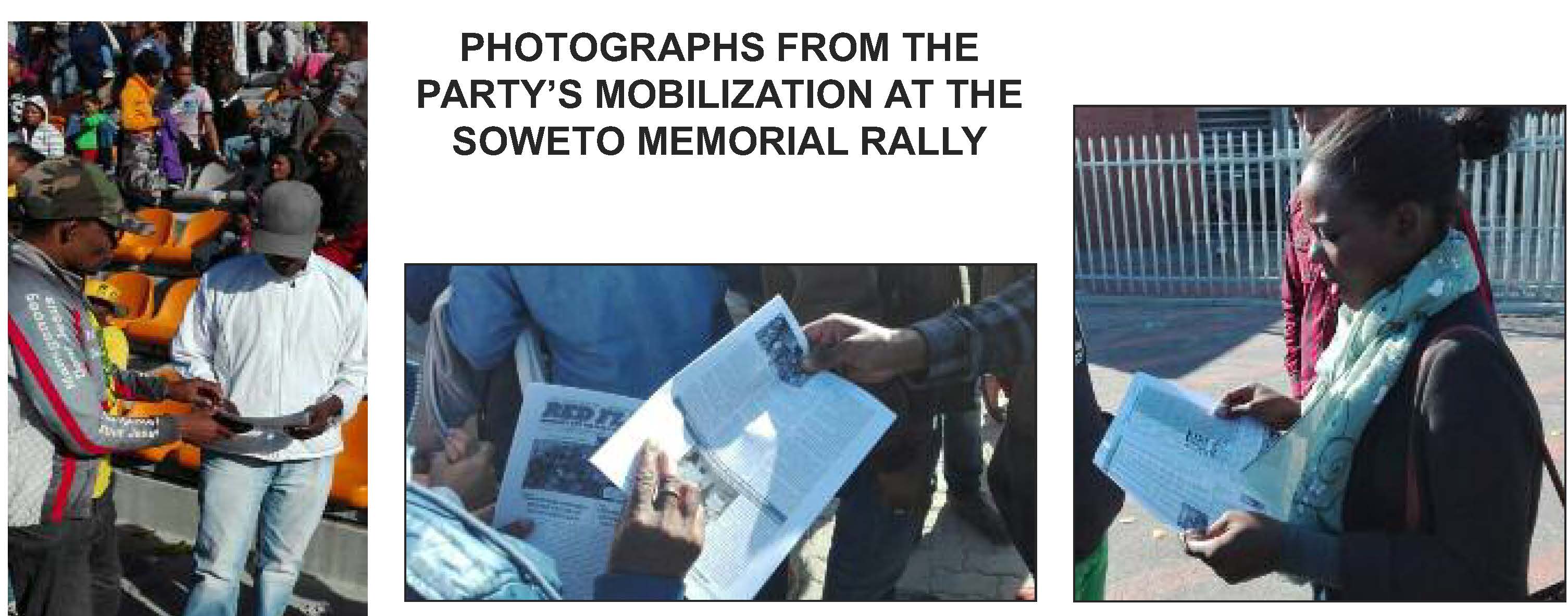
 |
FIGHT FOR COMMUNISM! |
International Communist Workers Party | |
LETTERS, CRITICISM AND SUGGESTIONS
Muhammad Ali: Anti-imperialist
The late Muhammad Ali’s antiwar activism in refusing U.S. military induction in 1967 is being whitewashed by the capitalist bosses’ media. Commentators say that Ali was for peace and against war. They cite President George W. Bush presenting the Presidential Medal of Freedom to Ali in 2005 and calling him a “man of peace.”
Muhammad Ali was against empire. Weeks before he refused the military induction, he responded to a reporter at a fair housing protest: “My conscience won’t let me go shoot my brother, or some darker people, or some hungry people in the mud for big powerful America. And shoot them for what? They never called me nigger, they never lynched me, they didn’t put no dogs on me, they didn’t rob me of my nationality, rape and kill my mother and father…Shoot them for what?...How can I shoot them poor people?”
He also said, “Why should they ask me to put on a uniform and go 10,000 miles from home and drop bombs and bullets on brown people in Vietnam while so-called Negro people in Louisville are treated like dogs and denied simple human rights? No. I’m not going 10,000 miles from home to help murder and burn another nation to continue the domination of white slave masters of the darker people the world over…The real enemy of my people is here.”
Muhammad Ali believed in solidarity with black, brown and poor people in the U.S., with the poor people of Viet Nam and those being killed in Viet Nam. He would not support a society that he viewed as uniquely brutal nor would he support U.S. imperialism.
Whatever his weaknesses were, Ali knew the enemy. His refusal to fight on the side of U.S. imperialism against the oppressed masses in Vietnam is an example that we can bring up with students and soldiers today. It helps point out that our real enemies are not our class brothers and sisters in other countries, but the capitalists of all countries. Talking about this history helps us understand the need to turn the guns on the bosses and fight for communist revolution.
This is not the lesson the ruling-class media want us to take from Ali’s example. But we can’t let the bosses distort the memory of the young fighter who inspired millions.
—California comrades with long memories
Sharing a T-Shirt and Building for Communism
Just next door to my house there’s a lady who saw our T -shirt from my washing line. She invited me into her house and asked me about our revolution. I even offered her Red Flags and my T-shirt. You know, last week on Monday morning she went to work wearing the T-shirt and her work mates asked her about our revolution. Then they wanted more Red Flags which I did send them. Now they want us to visit other masses from their workplace.
—A comrade in South Africa

Importance of the Cultural Revolution in China
I think that the article in the last Red Flag about the Cultural Revolution (CR) in China was not very helpful in spelling out its lessons for our movement. Most of the article mentioned communist aspects of China’s socialism that took place years earlier. I will try to point out a few specifics that help show the CR’s historical importance for us.
Mao and his allies in the party leadership aimed to mobilize the masses of workers,
peasants and students to overthrow the capitalist roaders “in authority,” using force where necessary. What the Maoists did not count on was that the capitalist roaders could also mobilize masses of supporters, usually those who were comparatively well off and had the resources of local governments behind them.
In Shanghai in January, 1967, there was a bloody struggle between large opposing mass organizations of workers and students that resulted in the “overthrow” of the city’s party structure. This was supposed to be replaced by a “Shanghai Commune” modeled on the Paris Commune of 1871. The Maoists in Beijing quickly replaced it with a “Revolutionary Committee” that included old cadres, the army and representatives of mass organizations. Across China, the members of Revolutionary Committees were mostly selected by back-room deals in Beijing and dominated by the military.
In many places the thinking of workers and students moved decisively to the left. In some, so-called “ultra-leftists” began a more general attack on China’s socialist system. The most influential expression of such ideas was an essay by Yang Xiguang, a 19-year-old student member of the Shengwulian rebel group in Hunan.
Synthesizing ideas from various ultra-leftist groups, Yang advocated the revolutionary overthrow of the “red bourgeoisie” and the creation of a “People’s Commune of China.” He did not realize that socialism is hopeless, and he disagreed with people who advocated “only one revolution” (fighting directly for communism). Still “ultra leftism” in the CR was a giant step forward for the communist movement.
The main thing that the huge mass struggles of CR have to teach us is that socialism can’t be reformed into communism. Whether measured by either the standard of the Maoists or of communist revolution, the CR failed. It paved the way for the rule of Deng Xiaoping, the biggest capitalist-roader of them all.
Millions fought bloody battles, hoping to get rid of the capitalist bureaucrats that oppressed them. The “capitalist road,” however, is inherent in socialism, which is itself a form of capitalism. Only a massive fight for communism can finally defeat capitalism.
—Comrade
Red Flag replies: Future articles in Red Flag will discuss the Cultural Revolution in more detail. We hope you will help write them.
MTA: Covering its Back
I recently attended an all-day class and the emphasis was to get us to do something personally and individually about alleviating the excessive stress that comes with our job.
With regards to the passengers with disabilities we were told that we should be more forthcoming before the camera. We should make all the motions of the help we are offering so that the passenger can’t claim he/she did not understand what we were saying. As usual, MTA’s main concern with this issue is liability.
—Los Angeles MTA driver
MTA: Blaming the workers
In my class they went over the new TAP cards. But they also told us MTA made too much money last year at the fare box. They are blaming the operator for that which makes no sense. They claim they are not getting any government money because of it. They were supposed to have made only $15 million but they ended making $23 million.
The issue is that they made over the expected amount. As usual the operators are the blame. We are not accountants. The issue is way above our pay scale. Anybody knows that the numbers and figures can be readjusted to fit the company’s purposes. They are just mad it has been found out by the government accountants so they don’t need the extra kickbacks they usually get, which just goes into the deep pockets of certain individuals and not to the operators’ safety.
Then they told us that if we get into an accident we can get sued personally. Mainly they are going to tell the passengers to sue us. The only thing I got out of the class was that when anything goes wrong at MTA it is the operators’ fault.
—Bus Driver, Los Angeles MTA
Making Things More Alike
“Would you like to take extra papers,” a comrade asked a Los Angeles bus driver who regularly reads Red Flag, “maybe for younger people in your family?”
“They are all grown and I don’t see them much,” the driver replied.
“How about neighbors?” asked the comrade.
“I hardly know the neighbors,” he answered.
“That’s a difference between here and South Africa,” the comrade said. “But we can change things here by getting to know our neighbors.”
“Well, give me two more papers,” the driver said. “I have three neighbors but one of them is away a lot and I never see him.”
Red Flag is a weapon in the class struggle that we can all use to defeat the alienation and cynicism of capitalist society. It can help us build relationships based on political struggle over communist ideas. These relationships will form the basis of the communist society we need.
—Los Angeles comrade
